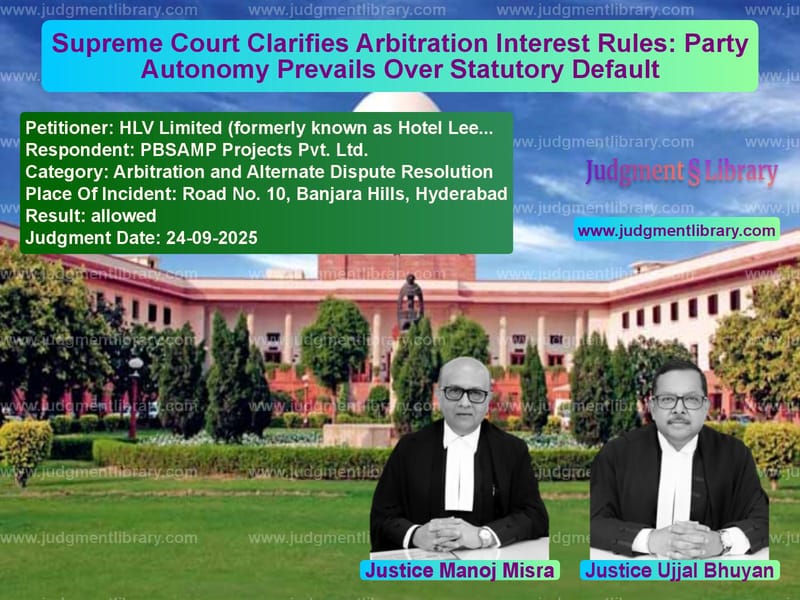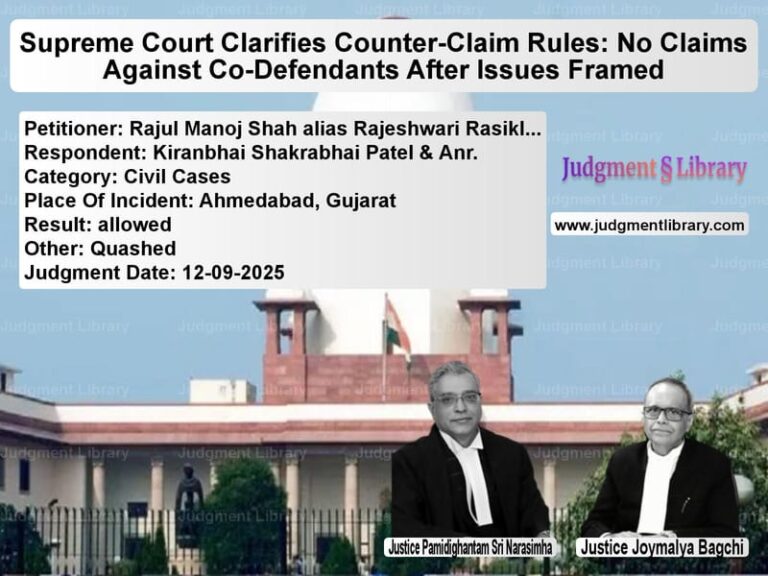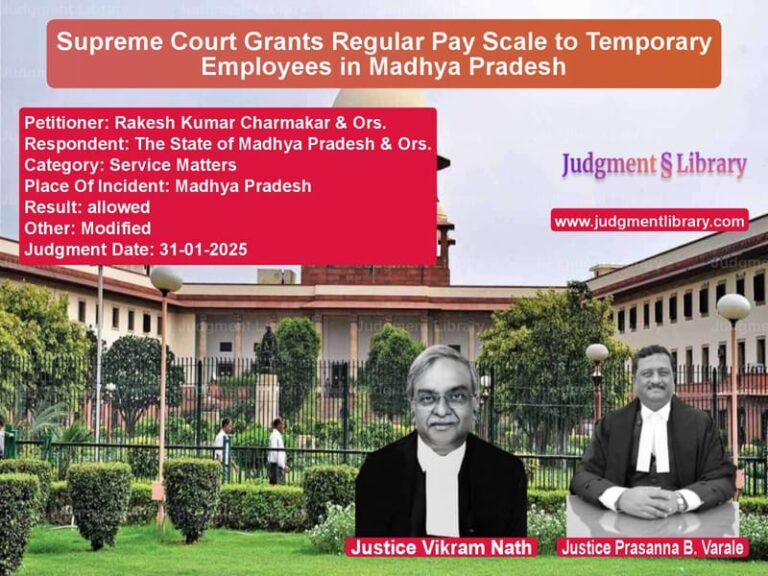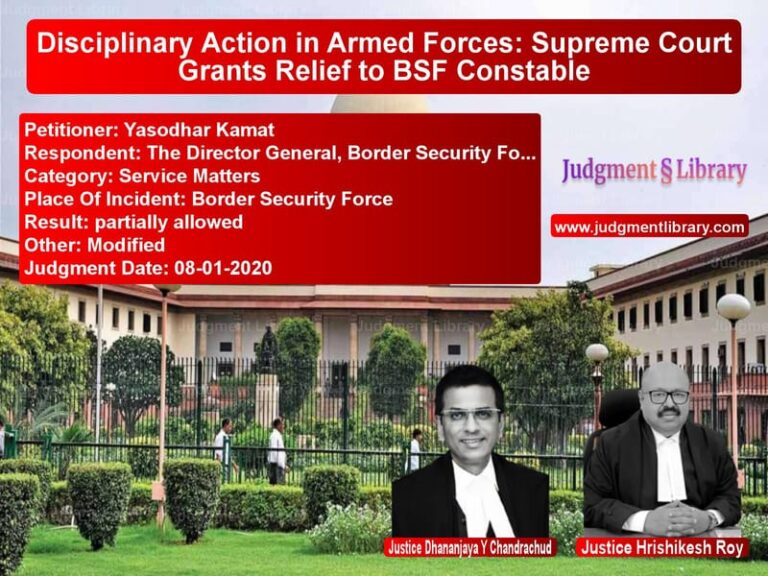Supreme Court Clarifies Arbitration Interest Rules: Party Autonomy Prevails Over Statutory Default
In a significant ruling that clarifies the complex interplay between contractual agreements and statutory provisions in arbitration cases, the Supreme Court of India recently delivered a judgment that reinforces the principle of party autonomy in commercial disputes. The case involved HLV Limited (formerly Hotel Leelaventure Pvt. Ltd.) and PBSAMP Projects Pvt. Ltd., centered around the interpretation of interest payments under the Arbitration and Conciliation Act, 1996.
The dispute originated from a Memorandum of Understanding (MoU) dated April 9, 2014, between the two companies regarding the sale of land situated at Road No. 10, Banjara Hills, Hyderabad. The land measured approximately 3 acres and 28 guntas and was initially intended for constructing a five-star hotel. When HLV Limited decided not to proceed with the hotel project, they entered into an agreement to sell the land to PBSAMP Projects, which paid an advance of Rs. 15.5 crores. After differences arose between the parties, the MoU was terminated on October 9, 2014, leading to arbitration proceedings.
The Arbitral Award and Initial Proceedings
The arbitral tribunal, comprising three distinguished members, passed an award on September 8, 2019, directing HLV Limited to pay PBSAMP Projects Rs. 15.5 crores “with interest at 21% p.a. from the date it was given to the date it is repaid.” This award attained finality after HLV Limited’s challenge under Section 34 of the Arbitration Act was dismissed by the Special Court on March 19, 2021.
During execution proceedings, HLV Limited paid a total of Rs. 44,42,05,254.00 between July 2022 and July 2023, claiming this amount represented full satisfaction of the award. However, PBSAMP Projects contested this, arguing they were entitled to compound interest over and above the 21% simple interest awarded by the tribunal.
The executing court rejected PBSAMP’s claim for compound interest, stating that “the executing court cannot go beyond the award passed by the arbitral tribunal” and that “the decree holder is not entitled for compound interest as claimed.” The court accepted HLV’s calculation and closed the execution case.
The High Court’s Intervention
PBSAMP Projects challenged this decision before the Telangana High Court, which set aside the executing court’s order in April 2024. The High Court found that the executing court had reached its conclusion “in a cryptic and cavalier manner” and remanded the matter back for fresh consideration, though clarifying it had “not expressed any opinion on the merit of the claim.”
Arguments Before the Supreme Court
Before the Supreme Court, Mr. Hemendranath Reddy, learned senior counsel for HLV Limited, made several key arguments. He submitted that “the award neither granted compound interest nor granted post-award interest” and that “arbitral tribunal had awarded composite interest i.e. simple interest of 21% per annum from the dates payment became due to the date of repayment.”
He emphasized that “respondent did not challenge this part of the award” and that “the award has since attained finality.” Therefore, “it is not open to the respondent now to claim either compound interest or post-award interest on the principal amount.”
Mr. Reddy further argued that “Section 31(7)(a) and Section 31(7)(b) of the 1996 Act has no application to the facts of the present case as the arbitral tribunal itself awarded composite interest covering the entire period from the time the cause of action arose till payment.”
On the other side, Mr. P.B. Suresh, learned senior counsel for PBSAMP Projects, contended that the High Court’s order was merely an order of remand that “does not determine any inter se rights of the parties” and therefore “calls for no interference.” He argued that “the interest for the prior period till the date of the award has to be capitalized which will then be the ‘sum’ in terms of Section 31(7)(a) of the 1996 Act” and on that basis, the judgment debtor is entitled to 21% post-award interest on this ‘sum.’
The Legal Framework
The Supreme Court’s analysis centered on Section 31(7) of the Arbitration and Conciliation Act, 1996, which states:
“31. Form and contents of arbitral award. (7)(a) Unless otherwise agreed by the parties, where and insofar as an arbitral award is for the payment of money, the Arbitral Tribunal may include in the sum for which the award is made interest, at such rate as it deems reasonable, on the whole or any part of the money, for the whole or any part of the period between the date on which the cause of action arose and the date on which the award is made. (b) A sum directed to be paid by an arbitral award shall, unless the award otherwise directs, carry interest at the rate of eighteen per centum per annum from the date of the award to the date of payment.”
The Court explained that “from a conjoint analysis of Section 31(7)(a) and Section 31(7)(b) of the 1996 Act, what is discernible is that insofar award of interest from the date on which the cause of action arose till the date of the award is concerned, the legislative intent is that the parties possess the autonomy to determine the interest and the rate of interest for the aforesaid period.”
The Court emphasized that “clause (a) i.e. discretion of the arbitral tribunal to award interest is subject to agreement by and between the parties. Therefore, party autonomy takes precedence over the discretion of the arbitral tribunal.”
The Crucial Contractual Clause
The turning point in the case was Clause 6(b) of the MoU, which stated:
“(b) The proposed purchaser may at its option terminate this MOU by sending to the proposed vendor an intimation of termination of MOU and demand for refund of advance paid together with 21% interest per annum from the respective dates of disbursement of the advances till actual date of payment of the same. The proposed vendor shall tender the advances together with 21% interest per annum within 30 days of receipt of intimation of termination from the proposed purchaser.”
The Court noted that “the arbitral tribunal in the award dated 08.09.2019 applied the aforesaid clause of the MOU while declaring that the claimant was entitled to Rs. 15.5 crores with interest at the rate of 21% per annum from the date it was given to the date it is paid.”
Court’s Reasoning and Precedent Analysis
The Supreme Court extensively analyzed previous judgments, including Hyder Consulting (UK) Limited Vs. Governor, State of Orissa, Morgan Securities and Credits Private Limited Vs. Videocon Industries Limited, and S.A. Builders Limited. The Court observed that these cases established that “the discretion of the arbitral tribunal to award interest under Section 31(7)(a) of the 1996 Act is subservient to the agreement between the parties. In other words, party autonomy, so crucial to arbitration, reigns supreme.”
The Court specifically noted that in Morgan Securities, it was held that “the phrase ‘unless the award otherwise directs’ in Section 31(7)(b) only qualifies the rate of interest” and that “Section 31(7)(b) does not fetter or restrict the discretion that the arbitrator holds in granting post-award interest.”
Final Ruling
In its conclusive analysis, the Supreme Court held: “Reverting back to the facts of the present case, we have already adverted to clause 6(b) of the MoU dated 09.04.2014 which expressly provided that in the event of termination of the MoU, the appellant must refund all advances with interest at the rate of 21% per annum from the respective dates of disbursement till repayment. Thus, in the light of the express provision contained in clause (a) of sub-section (7) of Section 31, the arbitral tribunal awarded interest in terms of the MoU from the date of the cause of action till the date of repayment. As the arbitral tribunal had expressly provided interest till the date of repayment, question of additional or compound interest under clause (b) of sub-section (7) of Section 31 of 1996 Act would not arise.”
The Court emphasized that “the arbitral tribunal in its award dated 08.09.2019 has faithfully complied with the MoU agreed by and between the parties” and that “the MoU did not stipulate compounding of interest; the arbitral tribunal did not award compound interest; therefore, respondent cannot at the stage of execution seek to introduce claim of compound interest by drawing on general principles.”
The Court warned that “allowing such a claim would amount to rewriting the award at the stage of execution which is impermissible.”
Conclusion
The Supreme Court allowed HLV Limited’s appeal, set aside the High Court’s judgment, and restored the executing court’s order. The ruling reinforces the fundamental principle that in arbitration proceedings, the terms agreed upon by the parties in their contract take precedence over statutory default provisions. When parties have specifically negotiated interest terms in their agreement, courts cannot introduce additional interest claims at the execution stage that would effectively rewrite the arbitral award.
This judgment provides crucial clarity on the interpretation of Section 31(7) of the Arbitration Act and underscores the importance of precise drafting in commercial contracts, particularly regarding interest provisions in case of termination or default.
Petitioner Name: HLV Limited (formerly known as Hotel Leelaventure Pvt. Ltd.).Respondent Name: PBSAMP Projects Pvt. Ltd..Judgment By: Justice Manoj Misra, Justice Ujjal Bhuyan.Place Of Incident: Road No. 10, Banjara Hills, Hyderabad.Judgment Date: 24-09-2025.Result: allowed.
Don’t miss out on the full details! Download the complete judgment in PDF format below and gain valuable insights instantly!
Download Judgment: hlv-limited-(formerl-vs-pbsamp-projects-pvt.-supreme-court-of-india-judgment-dated-24-09-2025.pdf
Directly Download Judgment: Directly download this Judgment
See all petitions in Arbitration Awards
See all petitions in Enforcement of Awards
See all petitions in Commercial Arbitration
See all petitions in Contract Disputes
See all petitions in Settlement Agreements
See all petitions in Judgment by Manoj Misra
See all petitions in Judgment by Ujjal Bhuyan
See all petitions in allowed
See all petitions in supreme court of India judgments September 2025
See all petitions in 2025 judgments
See all posts in Arbitration and Alternate Dispute Resolution Category
See all allowed petitions in Arbitration and Alternate Dispute Resolution Category
See all Dismissed petitions in Arbitration and Alternate Dispute Resolution Category
See all partially allowed petitions in Arbitration and Alternate Dispute Resolution Category







